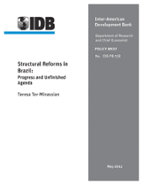Structural Reforms in Brazil: Progress and Unfinished Agenda
Date
May 2012
This paper discusses Brazil's structural reforms since the 1990s and areas where work remains to be done. Reforms of the 1990s included the containment of inflation, the adoption of a comprehensive Fiscal Responsibility Law, a successful debt restructuring program for subnational governments, the reduction of trade barriers, a wave of privatizations, and the expansion of health and education programs. Reforms of the 2000s included strengthening welfare programs, rapidly increasing the minimum wage, and reforming the financial sector to increase access to credit among lower income groups. Political opposition and other factors, however, have prevented reforms in the tax and pension systems and in the labor market. Brazil's recent strong economic performance owes more to generally sound macroeconomic management, and to a favorable external environment, than to a comprehensive and sustained structural reform effort. Doubts remain about the country's ability to sustain high growth rates while keeping inflation low.




